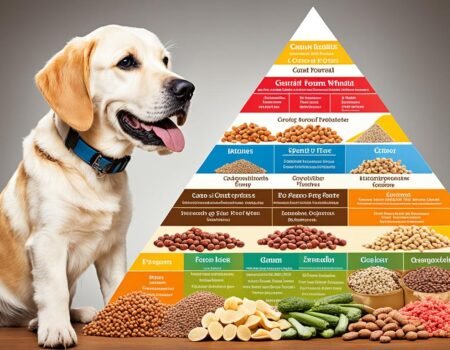As a dog owner, I know the heartbreak of watching your furry companion suffer from itchy, irritated skin and constant discomfort due to food allergies. It’s a painful experience to see them scratching and biting at themselves, desperate for relief. But fear not, because there is hope! I’ve done the research and found the best vet-approved dog food options to help alleviate your pup’s allergies and give them the relief they deserve.
Key Takeaways:
- There are many quality diets available to help dogs avoid food allergens.
- Consult with your veterinarian to determine if your dog has food allergies.
- Consider trying a limited ingredient diet or a vegetarian option for allergy management.
- Novel protein sources and hydrolyzed diets can also be beneficial for dogs with allergies.
- Our top picks for the best dry and canned dog food for allergies are Instinct Raw Boost Grain-Free Recipe with Real Salmon and Merrick Limited Ingredient Diet Grain-Free Real Lamb Recipe, respectively.
How to Choose the Best Dog Food for Allergies
If you suspect your dog is allergic to their food, talk with your veterinarian. Signs of environmental allergies and food allergies can be similar, and it’s possible that your dog could have one or both issues. Sometimes these issues can also be complicated with skin infections, which make itching even worse and require additional medical attention.
Common food allergens for dogs include chicken, beef, wheat, soy, and dairy. The official way to diagnose a dog with a food allergy is to conduct a food trial using a prescription hypoallergenic diet for a duration of 8 to 12 weeks. During this period, it’s crucial to eliminate all other sources of food, including treats and human foods.
- A food trial, also known as a dietary elimination trial, involves feeding your dog a limited ingredient diet with novel protein and carbohydrate sources. This eliminates potential allergens and helps identify specific ingredients causing the allergic reaction.
- For dogs suspected of having food allergies, it’s advisable to avoid common ingredients like wheat gluten and soy. Additionally, it’s a good practice to read ingredient lists on packaging. The first ingredient listed is the primary component of the food, so it should ideally be a high-quality protein source.
“If you suspect your dog is allergic to their food, talk with your veterinarian.”
“A food trial, also known as a dietary elimination trial, involves feeding your dog a limited ingredient diet with novel protein and carbohydrate sources.”
Choosing the best dog food for allergies depends on your dog’s specific needs and the results of the food trial. It’s important to consult with your veterinarian to determine the most suitable diet. Here are some common options for managing food allergies:
1. Limited Ingredient Diet
A limited ingredient diet is designed to minimize the number of ingredients your dog is exposed to, making it easier to identify specific allergens. These diets typically contain a single novel protein source and a limited number of other ingredients.
Table: Comparison of Limited Ingredient Diets for Managing Food Allergies
| Brand and Product | Main Protein Source | Additional Ingredients | Benefits |
|---|---|---|---|
| ACANA Singles Limited Ingredient Diet Pork & Squash Recipe | Pork | Squash, Sunflower Oil, Pumpkin, Ginger, Sun-Cured Alfalfa, etc. | Test out a new protein source while avoiding known allergens |
2. Vegetarian Diet
For dogs with multiple protein allergies, a vegetarian diet can be an alternative. These diets are typically based on plant-based protein sources such as pumpkin and sweet potatoes. However, it’s important to consult with your veterinarian to ensure your dog’s nutritional needs are met, especially for puppies and large breeds.
3. Novel Proteins
If your dog is allergic to common animal proteins like chicken, beef, and lamb, trying novel protein sources can be beneficial. These are proteins that your dog has never been exposed to and are less likely to cause an allergic reaction. Examples of novel protein sources include rabbit, pheasant, alligator, kangaroo, goat, bison, and venison.
4. Hydrolyzed Diet
In some cases, your veterinarian may recommend a hydrolyzed diet. Hydrolyzed diets have proteins that have been broken down into smaller fragments, making them less likely to trigger an immune system response. These diets can be helpful for dogs with severe food allergies or intolerances.
By considering these different food options for managing food allergies and working closely with your veterinarian, you can find the best dog food that suits your pet’s unique dietary needs and helps alleviate their discomfort.
Limited Ingredient Diet for Allergies
One of the best types of dog food to introduce to your dog in a diet trial is a limited ingredient formula. Recipes such as ACANA Singles Limited Ingredient Diet Pork & Squash Recipe are primarily composed of a main protein and a small handful of additional ingredients, which makes it easy to test out a new protein source while completely avoiding known allergens.
If your dog does better on a new food, it was likely that an ingredient in their previous meals caused an allergic reaction. Continue providing them the replacement food, and be sure to keep any known allergens out of their diet going forward for clear skin, a regular digestive system, and a happy dog.
Introduce a Vegetarian Diet for Allergies
Although it is relatively rare for dogs to have a negative reaction to multiple animal proteins, some allergy-prone pups may need an alternate veggie-based dog food for a healthy lifestyle. The most common veggie-based dog foods use pumpkins and sweet potatoes as the main ingredient, but other niche recipes are available.
A vegetarian diet should only be used under the advice of a veterinarian, particularly for puppies. It’s difficult to meet the nutritional needs of growing dogs with a food that contains no animal ingredients. Make sure the diet states that it meets the nutritional guidelines of the Association for the American Feed Control Officials (AAFCO) for your dog’s life stage. If your dog is a large breed puppy, make sure the food specifically states it’s suitable for puppies that will grow to be 70 pounds or more as an adult.
| Veggie-Based Dog Food | Main Ingredients | Nutritional Benefits |
|---|---|---|
| Pumpkins, sweet potatoes |
|
|
| Other niche recipes | Varies depending on the recipe |
|
By incorporating a vegetarian dog food into your pet’s diet, you can provide alternative protein sources while avoiding common allergens found in animal proteins. However, it’s essential to consult with a veterinarian to ensure your dog receives the necessary nutrients to support their growth and development.
Novel Proteins for Allergies
If your poor puppy is allergic to commonplace animal proteins like poultry, beef, lamb, and pork, then you’ll want to try a novel protein, which is a protein your pup has never had. There are many options that may be safe for your dog’s diet. Salmon, mackerel, and catfish all promote skin and coat health because they contain omega-3 fatty acids. Unconventional animal protein sources like rabbit, pheasant, alligator, kangaroo, goat, bison, and venison are all healthy options that are rarely allergens for dogs. Although novel protein sources may be the perfect solution for your formerly-itchy dog, be prepared to pay much more for these alternate dog food recipes.
When it comes to providing a hypoallergenic diet for your dog, incorporating novel protein sources can be a game-changer. These unconventional animal proteins not only offer a variety of flavors for your pup but also provide essential nutrients for their overall well-being.
Omega-3 Fatty Acids for Skin and Coat Health
Salmon, mackerel, and catfish are excellent sources of omega-3 fatty acids, which are known for their skin and coat benefits. These fatty acids help reduce inflammation, improve dry and itchy skin, and enhance coat luster. By adding novel protein sources rich in omega-3 fatty acids to your dog’s diet, you can support their skin health and alleviate allergy-related symptoms.
Price Considerations
While novel protein sources can be an effective solution for dogs with allergies, they often come at a higher price compared to traditional protein options. The scarcity and uniqueness of these protein sources contribute to their elevated cost. However, for pet parents who are dedicated to providing their dogs with relief from allergies, the investment in novel protein dog food can be well worth it.
It’s important to consider your budget and discuss the financial implications with your veterinarian when considering novel protein dog food options. They can provide guidance on finding the most suitable and cost-effective novel protein sources for your dog’s specific dietary needs.
Hydrolyzed Diet for Allergies
If your dog is suffering from food allergies, your veterinarian may prescribe a hydrolyzed diet as part of their treatment plan. A hydrolyzed diet involves proteins, such as chicken, being broken down into smaller molecules that are less likely to trigger an immune system response. This process makes the proteins easier for your dog’s body to digest and reduces the likelihood of an allergic reaction.
When proteins are hydrolyzed, their structure is altered in a way that the body no longer recognizes them as allergens. This can be beneficial for dogs with severe allergies or those that have not responded well to other allergy management strategies.
Hydrolyzed diets are typically formulated with hydrolyzed protein as the primary ingredient. These diets can sometimes be more expensive than regular dog food options due to the additional processing required.
One popular hydrolyzed diet option is the Science Diet Hydrolyzed Protein Dog Food. This diet has been specially formulated to minimize the risk of triggering an immune response in dogs with food allergies. It contains hydrolyzed chicken as the primary protein source, along with other carefully selected ingredients to provide a balanced and complete diet for your dog.
Benefits of a Hydrolyzed Diet
A hydrolyzed diet can offer several benefits for dogs with food allergies:
- Reduced risk of allergic reactions: By breaking down the proteins, a hydrolyzed diet minimizes the risk of allergens triggering an immune system response in your dog.
- Supports digestive health: The hydrolyzed proteins in the diet are easier for your dog’s digestive system to handle, reducing the likelihood of upset stomachs or gastrointestinal issues.
- Promotes skin health: Many dogs with food allergies experience skin-related symptoms, such as itching and inflammation. A hydrolyzed diet can help improve your dog’s skin condition by addressing the underlying allergens.
It’s important to note that a hydrolyzed diet should only be used under the guidance and recommendation of your veterinarian. They will be able to assess your dog’s specific needs and determine if a hydrolyzed diet is the right choice for managing their allergies.
By choosing a hydrolyzed diet for your dog, you are providing them with a specially formulated food that can effectively manage their food allergies. Always consult with your veterinarian to ensure you are selecting the most appropriate diet for your dog’s specific needs.
Best Dry Dog Food for Allergies
When it comes to finding the best dry dog food for allergies, Instinct Raw Boost Grain-Free Recipe with Real Salmon is our top pick. This vitamin and mineral-rich fishy formula is specially formulated to support dogs dealing with severe skin allergies. Its freeze-dried pieces of raw salmon and white fish meat not only provide a delicious flavor but also offer a high concentration of essential nutrients.
The Instinct Raw Boost Grain-Free Recipe with Real Salmon contains no grains, artificial colors, or preservatives, making it an excellent choice for dogs with sensitivities. The use of real salmon as the main protein source ensures a high-quality and easily digestible meal for your furry friend. This recipe is also enriched with omega-3 fatty acids, which are known to promote healthy skin and coat.
With its grain-free and high-protein formula, Instinct Raw Boost satisfies your dog’s nutritional needs while minimizing the risk of triggering food allergies. This kibble is also supplemented with fruits, vegetables, and other wholesome ingredients to provide a well-rounded and balanced diet.
Additionally, Instinct Raw Boost Grain-Free Recipe with Real Salmon is an excellent option for picky eaters. The freeze-dried raw pieces add a texture and taste that dogs find irresistible, making mealtime an enjoyable experience.
| Key Features of Instinct Raw Boost Grain-Free Recipe with Real Salmon |
|---|
| Grain-free formula |
| Rich in omega-3 fatty acids for healthy skin and coat |
| Freeze-dried pieces of raw salmon and white fish meat |
| No artificial colors or preservatives |
| High-protein recipe |
Best Canned Dog Food for Allergies
When it comes to finding the best canned dog food for allergies, one of our top picks is the Merrick Limited Ingredient Diet Grain-Free Real Lamb Recipe. This high-quality canned food option is specially formulated to cater to dogs with food allergies or sensitivities.
This canned dog food is made with deboned lamb as the first ingredient, providing a delicious protein source that is easy to digest. It is free of common allergens like poultry, potato, corn, soy, and peas, making it an excellent choice for dogs with specific dietary restrictions.
The Merrick Limited Ingredient Diet Grain-Free Real Lamb Recipe focuses on simplicity, using a limited number of carefully selected ingredients to minimize the likelihood of triggering allergic reactions. It is grain-free, which is ideal for dogs with grain sensitivities or allergies.
This dog food also contains essential vitamins and minerals to support your dog’s overall health and well-being. It is formulated to provide a balanced and complete diet, ensuring that your furry friend receives all the necessary nutrients.
Here is a breakdown of the key features of the Merrick Limited Ingredient Diet Grain-Free Real Lamb Recipe:
| Key Features | Benefits |
|---|---|
| Deboned lamb as the first ingredient | Provides a high-quality protein source |
| Grain-free | Suitable for dogs with grain sensitivities or allergies |
| Free of common allergens | Reduces the risk of triggering allergic reactions |
| Formulated with essential vitamins and minerals | Promotes overall health and well-being |
Overall, the Merrick Limited Ingredient Diet Grain-Free Real Lamb Recipe is an excellent choice for dogs with allergies or sensitivities. Its carefully selected ingredients and focus on providing a balanced and nutritious diet make it a top contender in the canned dog food market.
Customer Testimonial:
“I’ve been feeding my dog the Merrick Limited Ingredient Diet Grain-Free Real Lamb Recipe for a couple of months now, and I’ve noticed a significant improvement in his skin allergies. He loves the taste, and I love the fact that it doesn’t contain any common allergens. Highly recommended!”
Conclusion
When it comes to finding the best vet-approved dog food for allergies, there are many options to choose from. Whether you opt for a limited ingredient diet, a vegetarian option, a novel protein source, or a hydrolyzed diet, there are numerous ways to manage your dog’s allergies and ensure they have a healthy, balanced diet.
It’s important to work closely with your veterinarian to determine the best course of action for your furry friend. They can help identify your dog’s specific allergens and recommend the most suitable hypoallergenic dog food. By selecting a high-quality, allergy-friendly dog food, you can help alleviate your dog’s discomfort and improve their overall well-being.
Remember, allergies in dogs can be complex and may require a combination of dietary changes and other treatments. While finding the right dog food for allergies is crucial, it’s equally important to address other aspects of your dog’s health, such as regular exercise and routine veterinary care.
FAQ
What are some common food allergens for dogs?
Common food allergens for dogs include chicken, beef, wheat, soy, and dairy.
How can I diagnose a food allergy in my dog?
The official way to diagnose a dog with a food allergy is to conduct a food trial using a prescription hypoallergenic diet for 8 to 12 weeks, eliminating all other food sources.
What is a limited ingredient diet?
A limited ingredient diet is a dog food formula made primarily of a main protein and a few additional ingredients, making it easy to test new protein sources while avoiding known allergens.
Can I feed my dog a vegetarian diet?
A vegetarian diet should only be used under veterinary advice, as it can be difficult to meet the nutritional needs of growing dogs without animal ingredients.
What are some novel protein sources for dogs?
Novel protein sources include salmon, mackerel, catfish, rabbit, pheasant, alligator, kangaroo, goat, bison, and venison.
What is a hydrolyzed diet?
A hydrolyzed diet is one where the protein, even a common one like chicken, has been broken down in a way that the body no longer recognizes it as a problem.
What is the best dry dog food for allergies?
The top pick for the best dry dog food for allergies is Instinct Raw Boost Grain-Free Recipe with Real Salmon, which is rich in vitamins, minerals, and omega-3 fatty acids.
What is the best canned dog food for allergies?
The top pick for the best canned dog food for allergies is Merrick Limited Ingredient Diet Grain-Free Real Lamb Recipe, which is free of common allergens like poultry, potato, corn, soy, and peas.
How can I manage my dog’s allergies with food?
By selecting a high-quality, allergy-friendly dog food, working closely with your veterinarian, and following a specific dietary plan, you can help alleviate your dog’s discomfort and improve their overall well-being.










No Comment! Be the first one.